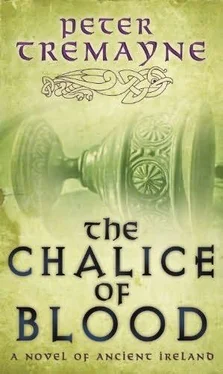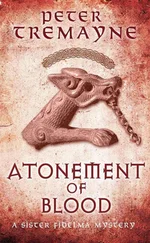Peter Tremayne - Chalice of Blood
Здесь есть возможность читать онлайн «Peter Tremayne - Chalice of Blood» весь текст электронной книги совершенно бесплатно (целиком полную версию без сокращений). В некоторых случаях можно слушать аудио, скачать через торрент в формате fb2 и присутствует краткое содержание. Жанр: Исторический детектив, на английском языке. Описание произведения, (предисловие) а так же отзывы посетителей доступны на портале библиотеки ЛибКат.
- Название:Chalice of Blood
- Автор:
- Жанр:
- Год:неизвестен
- ISBN:нет данных
- Рейтинг книги:5 / 5. Голосов: 1
-
Избранное:Добавить в избранное
- Отзывы:
-
Ваша оценка:
- 100
- 1
- 2
- 3
- 4
- 5
Chalice of Blood: краткое содержание, описание и аннотация
Предлагаем к чтению аннотацию, описание, краткое содержание или предисловие (зависит от того, что написал сам автор книги «Chalice of Blood»). Если вы не нашли необходимую информацию о книге — напишите в комментариях, мы постараемся отыскать её.
Chalice of Blood — читать онлайн бесплатно полную книгу (весь текст) целиком
Ниже представлен текст книги, разбитый по страницам. Система сохранения места последней прочитанной страницы, позволяет с удобством читать онлайн бесплатно книгу «Chalice of Blood», без необходимости каждый раз заново искать на чём Вы остановились. Поставьте закладку, и сможете в любой момент перейти на страницу, на которой закончили чтение.
Интервал:
Закладка:
‘I asked my son who held the keys to his room, since he was in such fear for his life. He told me that he had the only key.’
‘While you were in his cell and saw those precious manuscripts, did you know what they were? What sort of works were they?’
Lady Eithne sniffed, her chin rising a little.
‘My son was a great scholar. I can read and write my own language and I have a little Latin learning, but not much. I could scarcely understand the varied and unusual works that he had access to. I would not know Greek from Hebrew.’ Lady Eithne gave a shake of her head. ‘My son had several works in his room.’
‘Could one person have carried the manuscripts away with them?’
‘I suppose so. After all, he had to carry them himself on his journey from the Holy Land.’
‘He was also supposed to have brought back some artefacts,’ Eadulf said.
Lady Eithne’s hand went to the strange, ornate cross which hung round her neck.
‘Indeed. He brought back a piece of the True Cross for the abbey and he brought me this. It was a gift from both my sons, bought for me in the very town of Nazareth where Our Saviour grew up and began his work.’
‘Anything else?’
‘Not that I know of. Brother Lugna, surely you know what gifts he brought for the abbey.’
Brother Lugna shifted his weight and made an odd gesture with one hand, palm outwards. ‘A piece of the True Cross, which is now in our newly built chapel. A few icons and trinkets for decorative purposes, but that is all.’
‘So now …’ Lady Eithne suddenly rose, and they all followedher example. ‘It was merely my intention to come to greet you, Fidelma, and extend a welcome to this territory. I must return to my fortress. It is only a few kilometres to the east of the abbey but the sky is darkening. I would welcome your visit there. If there is anything else I can help you with, I shall be most willing. It is hard to lose both my sons …’ She smiled quickly. ‘Cathal is lost to me in a foreign land and now … now Donnchad …’ She ended with a shrug.
‘You have already been more than helpful, lady,’ Fidelma replied gravely.
Lady Eithne inclined her head to Fidelma and then to Eadulf, glanced at Abbot Iarnla in an almost disapproving way, and then turned towards the chamber door which Brother Lugna held open for her.
CHAPTER FIVE
After Brother Lugna had followed Lady Eithne down to the courtyard where two warriors of her escort were waiting, Abbot Iarnla reseated himself. He looked ill at ease.
‘Do I detect some tension between Lady Eithne and you?’ asked Fidelma, also sitting down again.
The elderly abbot looked up at her and his expression was not happy.
‘I preside over this abbey where her son has been murdered. In fact, I presided over it when her two sons were falsely accused of plotting the murder of her cousin, Maolochtair, Prince of the Déisi, and thereby forced them to go on pilgrimage to avoid his attentions.’
‘At my suggestion,’ pointed out Fidelma.
‘Nevertheless, I feel that I am the one she blames for all the misfortunes that have befallen her family.’
‘And do you feel that you are to blame?’
‘She believes that I am. That is enough.’
‘How powerful a person is Lady Eithne in this area?’ asked Eadulf. ‘Usually a …’ he fought for the right word, ‘a bain-trebthach … a widow … does not exercise much power.’
The abbot gave a quick shake of his head. ‘Lady Eithne was also a comthigerna , a co-lord, of the area, so that whenher husband died, even with her two sons living, she continued as lord of the area. While she answers to the senior Prince of the Déisi, Maolochtair’s successor, she has total command in this territory.’
‘A chieftain in her own right,’ Eadulf summed up.
‘That is so,’ confirmed the old abbot. ‘A bancomharba , female heir, to the lordship of this territory.’
‘Do you know what she means by these intrigues and jealousies in the abbey? Intrigues that would concern Brother Donnchad?’ Fidelma asked gently, returning to the main point.
‘I have no such knowledge. It is the first I have heard of it from Lady Eithne. But I fear that she accuses me.’
Eadulf was thoughtful. ‘Surely Brother Donnchad had an anam chara , a soul friend, with whom he discussed matters and made confession? We might be able to learn more of this from him.’
The anam chara was not exactly like the confessor priest in the Roman Church. The soul friend was someone with whom one could discuss one’s deepest and most intimate thoughts and problems; someone who shared one’s very soul and provided support and, where possible, guidance along the spiritual path. It was a concept that was ancient long before the coming of the new Faith and, Eadulf admitted, a better practice than merely the confessing of certain sins as defined by the rules of others, for which a priest could then issue punishments as penance.
‘Before he left on his pilgrimage, his soul friend was Brother Gáeth,’ replied the abbot. ‘Donnchad seemed to spend much of his time with Brother Gáeth. They had known one another since they were children.’
‘Then Brother Gáeth should be able to tell us what it was that troubled Brother Donnchad,’ Eadulf said.
Brother Lugna re-entered the room. Fidelma caught the uncomfortable glance that Abbot Iarnla cast at him as he entered. Brother Lugna had picked up on the last remark.
‘I am afraid you will not get much help from Brother Gáeth,’ he said firmly. ‘Since Brother Donnchad’s return, their friendship ceased. Brother Gáeth was forbidden even to approach him.’
‘Forbidden? By whom?’ queried Fidelma.
‘By none other than Brother Donnchad himself,’ replied the steward.
‘Nevertheless, we shall speak to Brother Gáeth,’ said Fidelma. ‘When did Brother Donnchad become so solitary? Presumably there was a period between the time he came back to the community and when he became reclusive.’
‘He arrived back in early summer. The problems really began about three or four days before his death,’ replied Brother Lugna. ‘I only knew him after he had returned from the pilgrimage, so I am not able to judge any differences in his character. All I can say is that he always kept himself and his thoughts to himself.’
The abbot nodded. ‘It is true that, after his return, he often seemed preoccupied. He was — how should I put it? — of an unfriendly disposition. He confided in no one, kept himself to himself and moved in a secretive way. But three or four days before his death, he locked himself in his cell and refused to see anyone.’
‘And you have no idea what caused him to do that?’
Brother Lugna was shaking his head but it was the abbot who replied. ‘There is no reason that I know of. All I know is that four days before his death, he returned to the abbey and shut himself in his cell.’
‘He returned to the abbey?’ Fidelma asked quickly. ‘I am not sure what you mean.’
Brother Lugna, who had compressed his lips in a reaction to the abbot’s words, now spoke awkwardly.
‘The abbot refers to the fact that Brother Donnchad left the abbey for an entire day without our knowledge. We ascribed this breach of our rules to his peculiar behaviour generally. As steward, I was going to reprimand him for that disobedience in not seeking our … the abbot’s approval. That day I noticed he did not attend the early morning service. Then Brother Echen, our stableman, mentioned that Brother Donnchad had taken a horse from the abbey stables and ridden off before dawn, saying that he would return that evening. Brother Echen naturally assumed that he had the permission of the abbot and myself.’
Читать дальшеИнтервал:
Закладка:
Похожие книги на «Chalice of Blood»
Представляем Вашему вниманию похожие книги на «Chalice of Blood» списком для выбора. Мы отобрали схожую по названию и смыслу литературу в надежде предоставить читателям больше вариантов отыскать новые, интересные, ещё непрочитанные произведения.
Обсуждение, отзывы о книге «Chalice of Blood» и просто собственные мнения читателей. Оставьте ваши комментарии, напишите, что Вы думаете о произведении, его смысле или главных героях. Укажите что конкретно понравилось, а что нет, и почему Вы так считаете.











